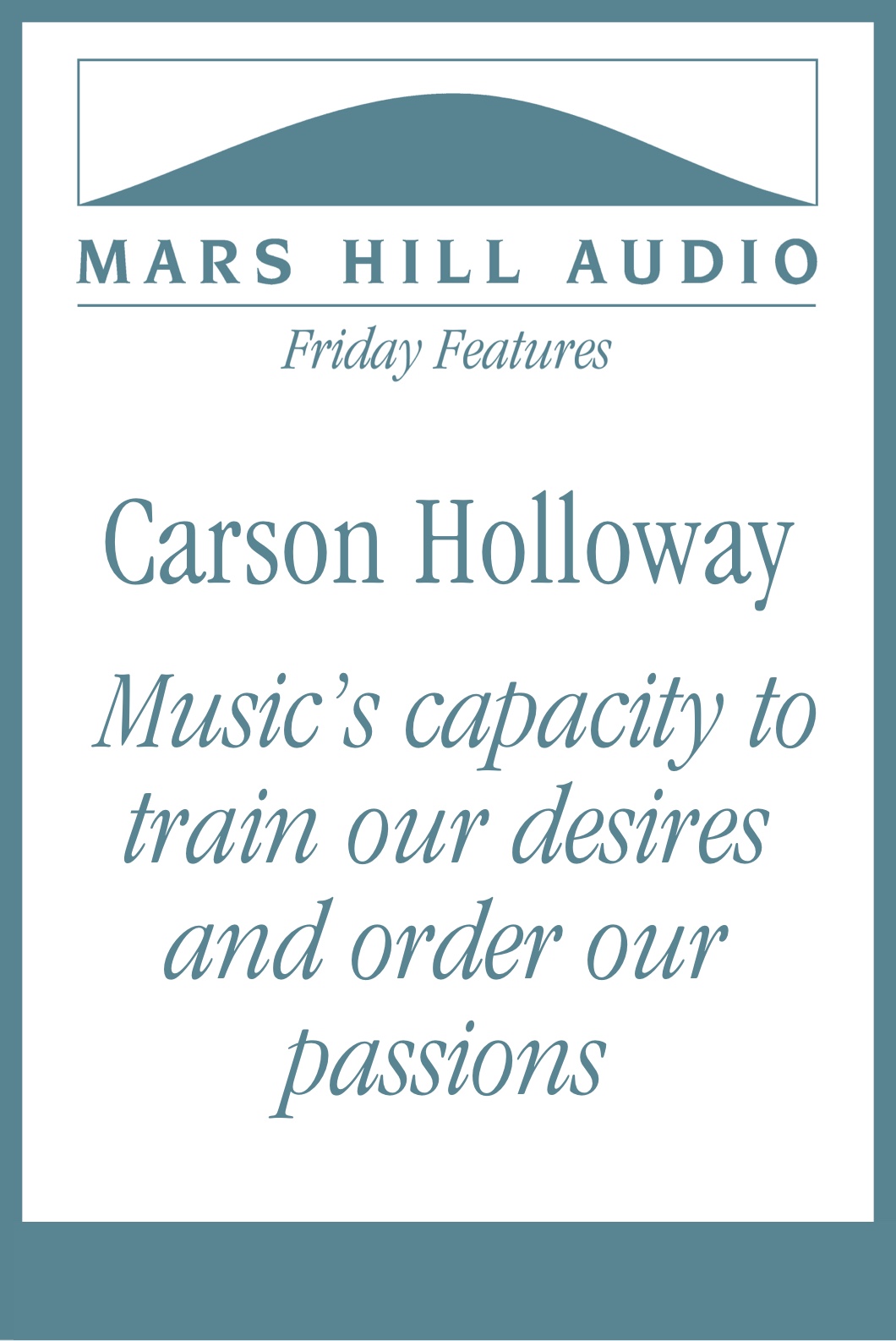
released 2/10/2023
“Music is irreducibly highly personal and subjective but also more than that — related to something that confronts us objectively, as the totality in which we live.” So writes Julian Johnson in Who Needs Classical Music? Cultural Choice and Musical Value (Oxford University Press, 2002). He talked about that book on Volume 65 of Journal. Today’s Feature presents an expanded version of that interview.
33 minutes
PREVIEW
The full-length track for this audio is only available to paid members and to listeners with a free Visitor’s Pass. If you are a member, log in here. If you would like a Visitor’s Pass, sign in here. You may purchase one of our complete memberships here. Happy listening!
More to hear . . .
Political philosopher Carson Holloway has studied how and why premodern political philosophers took music very seriously. They believed that “music can foster in the soul an inclination to take pleasure in, and thus to seek out, the rationally discernible order of nature.” The right kind of music could thus form the souls of citizens to encourage their pursuit of a well-ordered society. In this interview from 2001, Holloway discusses his book All Shook Up: Music, Passion, and Politics, which summarizes the dramatic chasm between the classical and modern views of political ends and of musical means.
This feature is available to listeners with a Mars Hill Audio membership.
Related reading and listening
- Antagonism or fruitfulness? —
FROM VOL. 108 Jean Porter describes how natural law justifies legal and moral authority within the life of the human person. (17 minutes) - Natural law as “performance” —
FROM VOL. 124 R. J. Snell discusses how novel ideas about natural law focus less on moral propositions and concepts and more on the thrust for meaning and value. (27 minutes) - “The Emersonian elixir” —
FROM VOL. 20 Robert Richardson and Roger Lundin discuss how Ralph Waldo Emerson’s legacy lingers in American culture. (18 minutes) - Mars Hill Audio Journal, Volume 164 — FEATURED GUESTS: Dana Gioia, Brady Stiller, Robert Royal, Richard DeClue, Tiffany Schubert, and Joonas Sildre
- Lex Rex, or Vox Populi Lex, or Rex Lex? — Law professor Li-ann Thio on the theological roots of belief in the rule of law
- Eugenics and the rise of “evolutionary ethics” —
FROM VOL. 70 Richard Weikart describes evolutionary ethics and examines the ties between national racism and the eugenics movements of the late nineteenth and early twentieth centuries. (16 minutes) - Privacy and a right to kill —
FROM VOL. 60 Russell Hittinger explains the legal history behind the “right to privacy” and how it was used in landmark cases involving abortion and physician-assisted suicide. (33 minutes) - Music, silence, and the order of Creation — In this lecture, Ken Myers explains how it is that our participation in harmonic beauty in music is a kind of participation in the life of God, in Whom all order and beauty coheres and is sustained. (61 minutes)
- Angelic voices: saying or singing? — Pope Benedict XVI on the intrinsically musical character of angelic utterance
- The physical beauty of music — Music can be likened to a cathedral, says professional guitarist Gordon Kreplin, when it creates through silence and sound a meditative space into which one may enter and encounter God. (14 minutes)
- Music and the meaning of Creation — In this 2018 lecture, Ken Myers advocates for a recovery of the pre-Enlightenment idea of the intelligibility of music. (61 minutes)
- Counterpoint as a “spirited discussion” — In this essay, John Ahern explains the beauty and order of counterpoint, the accumulation of multiple melodies that come together in a harmonious whole. (20 minutes)
- The Decline of Formal Speech and Why It Matters — John McWhorter examines the reasons behind the decline in articulate speech and writing in the late 20th century, and the implications of this change across many areas of culture. (55 minutes)
- The political wisdom of Edmund Burke —
FROM VOL. 28 Daniel Ritchie discusses the enduring political wisdom of British statesman and political thinker Edmund Burke (1729–1797). (13 minutes) - Torrential winds of doctrine — Joseph Cardinal Ratzinger on the “dictatorship of relativism”
- Forms as portals to reality — Ken Myers explains the ancient classical and Christian view that music embodies an order and forms that correspond to the whole of created reality, in its transcendence and materiality. (54 minutes)
- When is civil disobedience necessary? — Douglas Farrow examines the relation between “the kings of the earth” and the law of Christ, particularly when governmental law is exercised without reference to natural or divine law. (49 minutes)
- How music reflects and continues the created order — Musician, composer, and teacher Greg Wilbur explores how music reflects the created order of the cosmos. (55 minutes)
- On The Abolition of Man —
FROM VOL. 154 Michael Ward explains why The Abolition of Man is one of Lewis’s most important but also most difficult books. (36 minutes) - Education, reason, and the Good — Justin Buckley Dyer and Micah J. Watson on C. S. Lewis’s argument about natural law
- Martyrdom and music — To mark the feast day of the Martyrdom of Polycarp, we offer an interview from 2004 with composer J. A. C. Redford and poet Scott Cairns about their work together on an oratorio based on the story of Polycarp’s death. (15 minutes)
- Maximalist music —
FROM VOL. 8 Dominic Aquila explains how — unlike the minimalist composers John Cage and Philip Glass — Arvo Pärt uses purity and simplicity to point beyond the created world to the transcendent Creator. (6 minutes) - Turn to the Lord your God — Ken Myers introduces musical settings from the book of Lamentations, traditionally sung during Holy Week. (26 minutes)
- Music, passion, and politics — In this interview from 2001, Carson Holloway discusses his book All Shook Up: Music, Passion, and Politics, which summarizes the dramatic chasm between the classical and modern views of political ends and of musical means. (45 minutes)
- A remedy for relativism — Geoffrey Wainwright analyzes Joseph Cardinal Ratzinger’s thought on how the crisis of relativism in the West manifests in society and the arts, showing how Ratzinger grounded his response in a deep theology of worship and liturgy. (78 minutes)
- The mysteries and glory of Christmas and its music — Ken Myers presents examples of music from five centuries that capture some sense of the astonishing fact of the Nativity of our Lord. (15 minutes)
- Mars Hill Audio Journal, Volume 154 — FEATURED GUESTS: Felicia Wu Song, Michael Ward, Norman Wirzba, Carl Trueman, D. C. Schindler, and Kerry McCarthy
- Stabat Mater dolorosa — Ken Myers offers some thoughts on the aesthetics of sympathy, and introduces some of the musical settings of the remarkable medieval poem known as “Stabat Mater dolorosa.” (23 minutes)
- The Incarnation presented in music — Composer J.A.C. Redford talks about the theme of the Incarnation as musically presented in his choral symphony for Christmas entitled “Welcome All Wonders.” (23 minutes)
- Music for St. Cecilia’s Day — Ken Myers introduces several poems and related musical compositions that celebrate the heavenly gift of music and thereby honor St. Cecilia. (21 minutes)
- The Mystery Sonatas of Heinrich Biber — Baroque violinist Fiona Hughes reflects on Heinrich Biber’s 15 “Mystery Sonatas,” each of which corresponds to one of the mysteries in the life of Jesus and Mary that focused meditative devotion. (14 minutes)
- Is there a transcendent order of which we are a part? — Sociologist Zygmunt Bauman argues that the spirit of the (hyper) modern world is one of relentless disposability and of denial of a transcendent order to the cosmos. (36 minutes)
- Roger Scruton: Music as an Art — Philosopher Roger Scruton explains why there are some things — music in particular and art in general — which one can’t rightly or fully perceive without making judgments. (32 minutes)
- Origins and attributes of Handel’s Messiah — Calvin Stapert explains the origins and character of Handel’s Messiah and describes the work as a Christocentric theological response to the nascent deism in the society and church in Handel’s time. (19 minutes)
- Creation, natural law, and ecological concerns — Christopher Thompson discusses our need to grow in wisdom and humility, that we might flourish in this ordered cosmos in which we live. (16 minutes)
- St. Paul’s conversion set to music — Mendelssohn biographer R. Larry Todd provides a context for appreciating Mendelssohn’s work in the context of his life and faith. (24 minutes)
- Mars Hill Audio Journal, Volume 130 — FEATURED GUESTS: Jacob Silverman, Carson Holloway, Joseph Atkinson, Greg Peters, Antonio López, and Julian Johnson
- Cadences which break (or mend) the heart — George Steiner on the mystery of musical meaning
- Mars Hill Audio Journal, Volume 128 — FEATURED GUESTS: Matthew Crawford, Carlo Lancellotti, James Turner, Rod Dreher, Mark Evan Bonds, and Jeremy Beer
- Principles have to be discovered, not chosen — Alasdair MacIntyre on the problem of natural law and contemporary culture
- Mars Hill Audio Journal, Volume 124 — FEATURED GUESTS: John Fea, Robert F. Rea, John C. Pinheiro, R. J. Snell, Duncan G. Stroik, Kate Tamarkin, and Fiona Hughes
- Mars Hill Audio Journal, Volume 108 — FEATURED GUESTS: Thomas Albert Howard, Jean Porter, Peter Augustine Lawler, Hans Boersma, Felicia Wu Song, and Elias Aboujaoude
- Mars Hill Audio Journal, Volume 107 — FEATURED GUESTS: Victor Lee Austin, Ellen T. Charry, Anthony Esolen, Ferdinand Schlingensiepen, Allen Verhey, and Calvin Stapert
- Robert R. Riley: “The Music of the Spheres, or the Metaphysics of Music” — Robert R. Riley contrasts two sets of assumptions about music, and introduces two 20th-century composers who rejected the metaphysics of chaos in their compositions: the Danish composer Vagn Holmboe and the American John Adams. (43 minutes)
- Mars Hill Audio Journal, Volume 94 — FEATURED GUESTS: Maggie Jackson, Mark Bauerlein, Tim Clydesdale, Andy Crouch, and Jeremy Begbie
- Mars Hill Audio Journal, Volume 93 — FEATURED GUESTS: Alan Jacobs, James A. Herrick, Robert C. Roberts, J. Daryl Charles, Allan C. Carlson, and Sheila O’Connor-Ambrose
- Mars Hill Audio Journal, Volume 88 — FEATURED GUESTS: Diana Pavlov Glyer, Michael J. Lewis, Steve Talbott, Darryl Tippens, Everett Ferguson, Alexander Lingas, and Calvin Stapert
- Mars Hill Audio Journal, Volume 87 — FEATURED GUESTS: John Witte, Jr., Steven Keillor, Philip Bess, Scott Cairns, and Anthony Esolen
- Richard Sherlock: “The Secret of Straussianism” — Richard Sherlock explores the significance of political philosopher Leo Strauss’s methodology, focusing on how he understood the communication of ideas in classical and modern thought about political order. (36 minutes)
- Art and whateverism — Jed Perl on why great art is triumphantly intolerant
